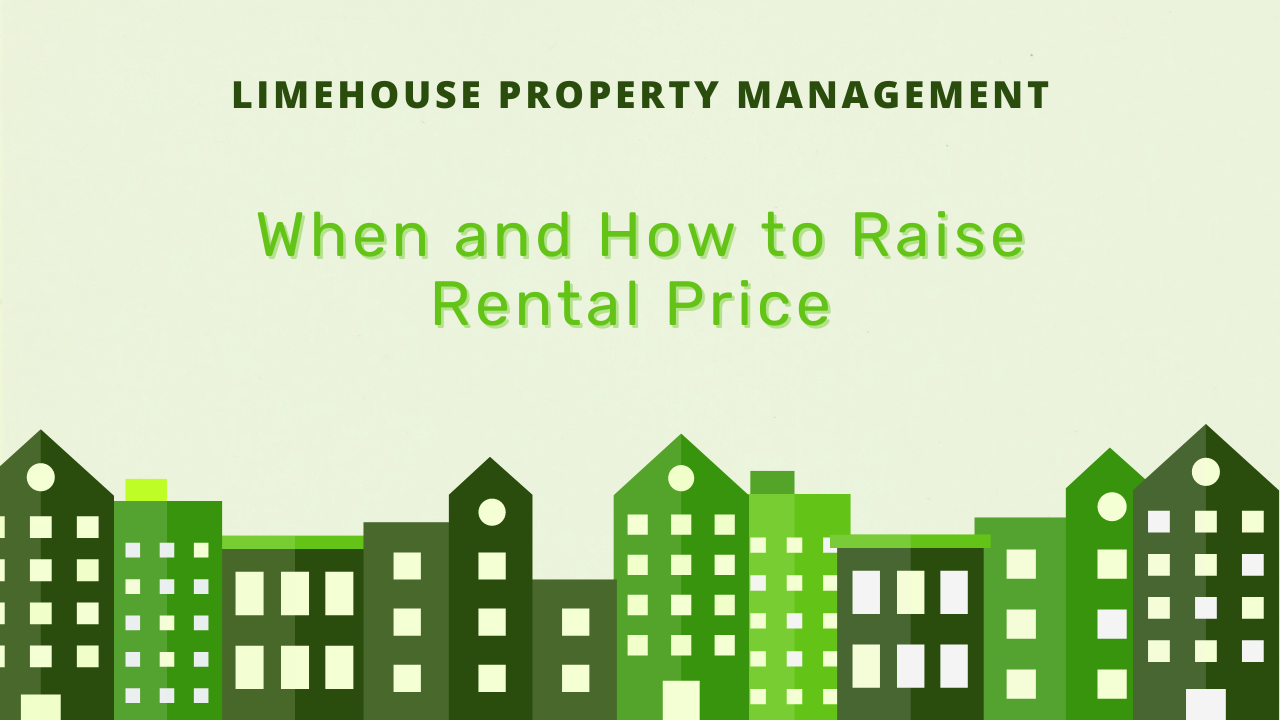When and How to Raise Rental Price

As a rental property owner, you want to maximize your investment’s return while keeping your tenants happy. One way to increase your income is by raising rental prices, but it’s crucial to approach this strategically.
Timing, communication, and understanding the market are all critical components to ensure you’re making the right decision without risking tenant turnover.
When to Raise Rent: Identifying the Right Timing
1. Market Conditions and Comparable Rates
The best time to consider a rent increase is when the local rental market supports it. If the average rental rates in your area have gone up, it might be time to adjust your rent accordingly. Pay attention to what similar properties are charging, and assess whether your current rate is still competitive.
Tip: Use rental listing websites and real estate reports to check market trends in your area. This data will help you determine if an increase is justified or if you should wait until the market changes.
2. Lease Renewal Period
Raising rent is most common when a lease is up for renewal. It’s the natural point to reassess rental rates, giving both you and your tenant a chance to evaluate the terms. Most tenants expect potential changes at the end of their lease, making this the ideal time to implement a rent increase without it feeling abrupt.

Tip: Notify your tenants about any rent changes at least 60 days before their lease ends. This provides them with ample time to consider their options and reduces the likelihood of sudden pushback or turnover.
3. Property Improvements and Upgrades
If you’ve invested in upgrades or renovations that significantly improve the property, it’s reasonable to consider a rent increase. Adding amenities like new appliances, updated flooring, or enhanced security features increases the property’s value, justifying a higher rent.
Tip: Make sure to communicate these upgrades to your tenants, emphasizing how the improvements add value to their living experience.
4. Inflation and Rising Costs
Over time, inflation and the rising costs of property maintenance, insurance, taxes, and utilities may necessitate a rent increase. Staying ahead of these expenses ensures that your rental income covers all the associated costs while still generating a profit.
Tip: Keep an eye on inflation rates and other economic indicators. A moderate, regular increase (e.g., 2% to 3% annually) can help you keep up with inflation without surprising your tenants.
How to Raise Rent: A Step-by-Step Approach
1. Research and Set a Fair Rate
Before raising rent, do thorough research to determine a fair and competitive rate. Consider factors such as your property’s condition, location, amenities, and comparable rental prices in your neighborhood.

Tip: Avoid sudden, drastic increases. Incremental changes, such as 3-5%, are more manageable for tenants and reduce the risk of them looking for cheaper options.
2. Check Local Laws and Regulations
Rent control laws vary by state and city, and it’s crucial to ensure your rent increase complies with local regulations. Familiarize yourself with rent increase limits, notification requirements, and other legal aspects to avoid disputes.
Tip: Consult with a professional property management company to navigate these regulations and ensure you’re operating within legal boundaries.
3. Provide Proper Notice
Transparency is key when raising rent. Send a formal rent increase notice to your tenants well in advance, specifying the new rent amount, the effective date, and the reasons for the increase. This not only fosters good communication but also gives tenants time to adjust their budgets.
Tip: Offer to discuss the increase with your tenants if they have any concerns. Being open and approachable can reduce resistance and maintain a positive landlord-tenant relationship.
4. Highlight the Benefits
When informing tenants of a rent increase, emphasize any improvements, amenities, or added services that justify the higher rate. For example, if you’ve recently renovated the unit or added new amenities, make sure your tenants understand how these enhancements benefit them.

Tip: If you’re increasing rent due to rising costs or market adjustments, provide some context to help tenants understand why the change is necessary.
The Value of Working with a Professional Property Management Company
Raising rent is a delicate process that requires market knowledge, legal awareness, and excellent communication skills. This is where a professional property management company can be an invaluable asset. Here’s how partnering with experts can benefit you:
- Accurate Market Analysis: Property management companies have access to up-to-date market data and rental trends. They can provide accurate assessments of when and how much to raise rent, ensuring you stay competitive without overpricing your property.
- Legal Compliance and Risk Management: Understanding landlord-tenant laws, rent control regulations, and notification requirements can be overwhelming. A professional property management company ensures you comply with all legal obligations, minimizing the risk of disputes and potential legal issues.
- Effective Communication with Tenants: Property managers are skilled in communicating rent increases in a way that’s transparent, professional, and empathetic. They handle the entire process, from drafting notices to addressing tenant concerns, saving you time and reducing the likelihood of tenant turnover.
- Maximizing Rental Income: By regularly reviewing market rates and rental property performance, a property management company can identify opportunities to increase rent while maintaining high occupancy rates. They understand how to strike the right balance between profitability and tenant retention.

- Property Maintenance and Upgrades: Maintaining and upgrading your property can significantly impact your ability to justify rent increases. Property managers coordinate repairs, renovations, and ongoing maintenance, ensuring your property remains in top condition and attractive to tenants.
Final Thoughts
Raising rental prices is a crucial aspect of managing a successful rental property, but it requires careful consideration and strategy. By understanding when to increase rent and how to implement changes smoothly, you can boost your income while maintaining positive tenant relationships.
Partnering with a professional property management company can make this process even more seamless, ensuring you’re always in compliance with laws, staying competitive in the market, and maximizing your rental income.
If you’re looking to take the stress out of managing rent increases and want expert guidance, consider working with a reliable property management company. Contact Limehouse Property Management if you need help, and we’ll be happy to help you!
